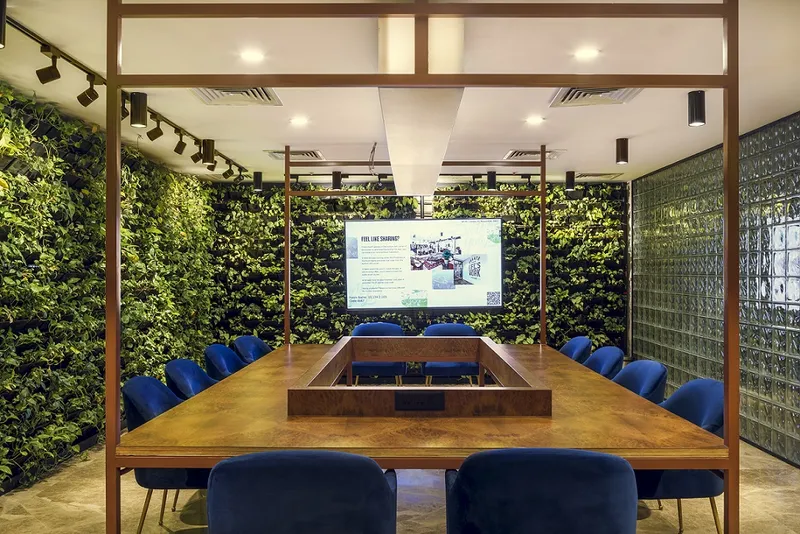‘We’ is greater than ‘me’ – how WeWork India promotes creativity, community and collaboration for startups and corporates
From local community managers to a global pass, this co-working space connects innovators in a fast-growing international web.
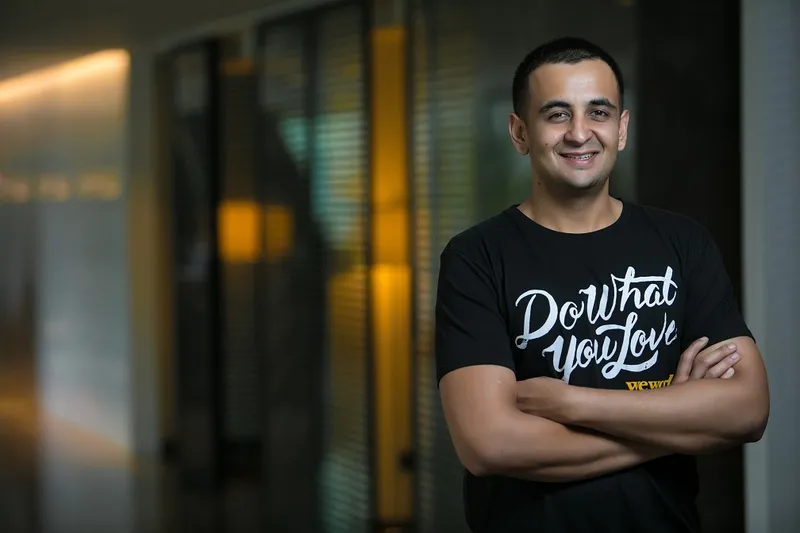
[This article is part of the YourStory series Startup Hatch, about incubators, accelerators, makerspaces and co-working spaces in the startup ecosystem. See earlier profiles of initiatives at IIT Bombay, IIM Bangalore, BITS Pilani, NCL, Tata Elxsi, Axilor, NID, IIIT-Bangalore, IIIT-Hyderabad, Vellore Institute of Technology, PSG Coimbatore, Workbench Projects, Makers Asylum, Appy Hours, Turning Ideas, NetApp Excellerator, Pitney Bowes Accelerator, TechStars, Indigram Labs, Ashoka Innovators, and Startup Leadership Programme.]
Karan Virwani is General Manager at WeWork India. He is an alumnus of Kent University and a serial entrepreneur. In the hospitality sector, he launched the eateries Sanchez and Singkong, as well as Entrée, a food delivery app. By bringing WeWork to India, he aims to build a new business model for the millennial workforce.
Karan believes in the work culture of ‘Do What You Love’ in the Indian scenario with WeWork, where one joins as an individual but ultimately becomes a part of the greater ‘we.’ His other interests include adventure, cars and driving.
Karan joins us in this interview on community models of work for the startup and corporate sectors, India trends in the future of work, design partnerships, technology integration, and networked innovation for entrepreneurs.
YS: What was the founding vision of your co-working space, and how is it supported?
Karan Virwani: WeWork’s mission is to create a world where people work to make a life, not just a living. WeWork is redefining success as measured by personal fulfillment, not just the bottom line. There has been a macro shift toward a new way of work — one focused on a movement towards meaning.
WeWork is accelerating this movement. We do this by providing our members high-quality and world-class spaces, use technology to create an environment to utilise the space more efficiently, and create collaboration by bringing like-minded and passionate people together.
YS: How does India fit into your global plans?
KV: As per IMF data, India is forecasted to grow 7.4 percent in 2019 against 6.7 percent this year, making it the fastest growing major economy in the world; when we entered India in 2017, the country had seen the best global growth in seven years. Our business model helps upcoming businesses foster innovation, and provides the space, services, and community that the new generation requires.
In fact, the government’s Make In India campaign is fostering the growth of a lot of business and entrepreneurs in the country and has been a major catalyst in the last few years. It has successfully created innovation and disruption in many different industries.
We are a global company with a local playbook - India is one of our fastest growing markets and we are looking at democratis-ng the co-working space, building communities and helping members to do what they love. We are present in three primary cities and have six facilities with over 10,000 members (three in Bengaluru, two in Mumbai, one in Delhi-NCR).
Our focus is to make sure our members are happy and having the best experience possible. Our two new facilities are coming up next month: WeWork Vikhroli in Mumbai and WeWork Hebbal in Bengaluru. We also plan to enter new markets like Pune, Chennai and Hyderabad next year.
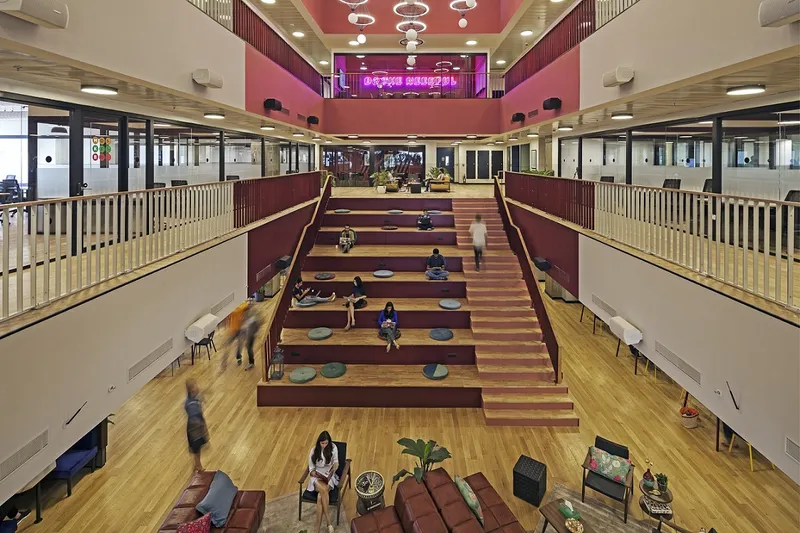
YS: What is your value proposition for startups?
KV: We have a diverse set of startups that are members of our community. The composition largely reflects the overall startup ecosystem with forward-thinking companies using technology to solve problems in finance, healthcare, food, business services and consumer products.
Beyond world-class space, flexibility and a large range of business services, our strongest value proposition is our community. With leading venture capitalists and large enterprises as part of our community of 210,000 members globally, it gives startups easy access to capital and strategic opportunities to help grow their businesses.
YS: And what is your value proposition to corporates?
KV: Large enterprises are one of our fastest growing categories at WeWork. In India, we have close to 45 percent of our members as enterprise. We not only solve their real estate requirements by offering space as a service but give them a more flexible and asset light option that helps them stay nimble.
The larger value proposition is WeWork tends to be a more cost-effective alternative to traditional real estate. But beyond that, large enterprises come to us for energy: we help them enrich their culture, enhance employee satisfaction and improve retention. By joining WeWork, we help members enrich their own companies and culture - allowing them to do what they love.
YS: What is the profile of the managers of your co-working spaces?
KV: WeWork attracts some of the most diverse talent across the board -- from entrepreneurs and architects to hospitality and creative professionals. They come together towards one collective mission: to help people create their life’s work.
YS: What would you say are the top opportunities for Indian entrepreneurs?
KV: There are a lot of interesting large-scale problems to be solved with innovation and entrepreneurship; this is matched with a large young population that rests as an addressable market.
There is a huge scope in building homegrown brands and scaling them globally and to build companies that are driven by culture and mission. Talent is inclined to work with startups and there is a steady increase of capital to back businesses with strong foundations that are made for India.
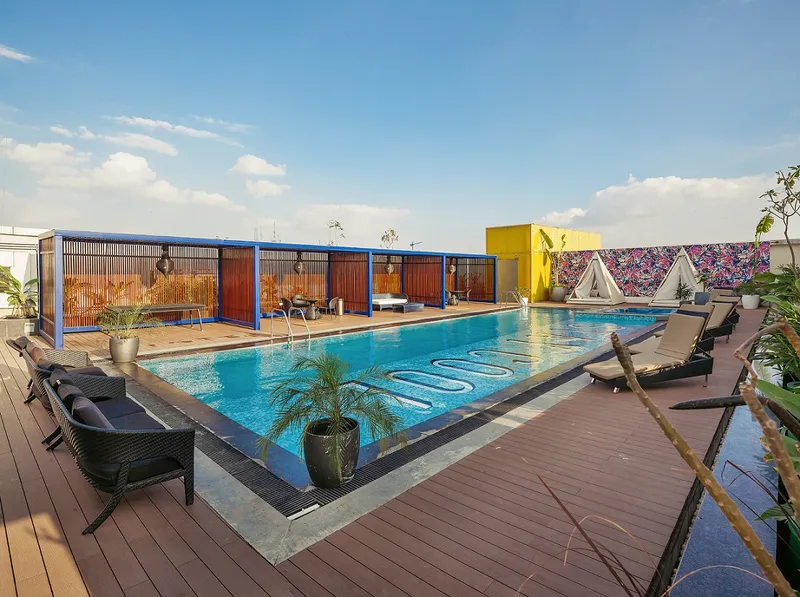
YS: What are the key challenges faced by startups in India, and how can you help bridge the gap?
KV: Basic infrastructure, access to resources that help long-term growth, access to talent, and absence of mentorship. Our spaces foster collaboration and encourage inclusive growth. Our community managers have the ability to understand the company’s requirements and make the right introductions to help solve their needs.
We use technology (Member Network on app) to enable people to connect and collaborate more efficiently. There are relevant events and engagements that give startups the opportunity for positive leverage. And most importantly, we propagate strongly the message that WE is greater than ME.
YS: What support and services do startups receive in your co-working space?
KV: WeWork offers meaning and flexibility to its members in their daily lives - which means, it allows them to work on projects they are passionate about in an energetic environment where others are also working hard to bring their ideas to life. We offer a global community of 210,000+ members around the world, helping people to grow and evolve and build relationships with other humans.
In addition, WeWork members have access to a number of services including health insurance, an internal social network, weekly events and workshops, and other business services to help them succeed.
YS: Do you also invest in the startups?
KV: We do invest in startups that are aligned to our brand and overall business. By bringing innovative companies like Flatiron School and Meetup into the We family, we provide members with the resources and options they need to succeed.
YS: How would you differentiate your co-working space from the others in India?
KV: We don’t limit ourselves to co-working – co-working accounts for a small portion of our portfolio. We are building the future of work and disrupting traditional real estate: building a global community of forward-thinking entrepreneurs, SMEs and larger enterprises, and using technology and our spaces to bring people together.
We transform buildings into dynamic environments for creativity, focus, and collaboration. More than just a new way of working, though, this is a movement toward a new way of living.
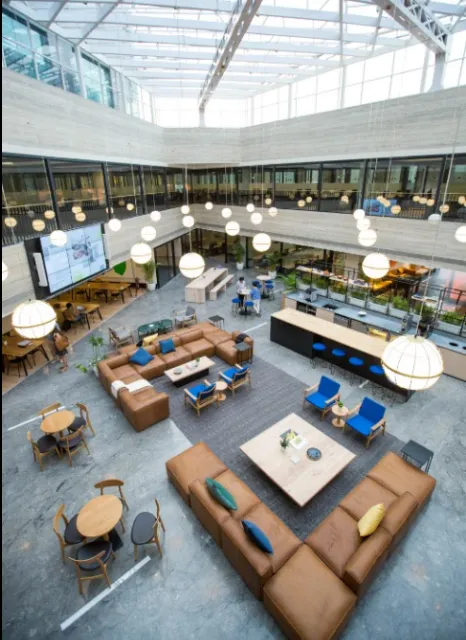
YS: What would you define as success for your co-working spaces?
KV: Ever since the launch of WeWork in India in 2017, we received interest from several of our Asia-Pacific locations from mid-to-large sized potential member companies. Today, we have strong partners and are building a foundation in the region.
As we grow, we will be able to provide multinational companies seeking to expand to India a home base that can help them attract talent and navigate the local landscape, collaborate with other creative thinkers and business leaders in the region, and grow. With 200+ locations around the world, we are also the perfect place to start for Indian companies looking to grow their businesses abroad.
This exchange and building of community will nurture India’s growth on the global map. Being able to provide people a space where we enable them to work on projects they are passionate about and work hard to bring their ideas to life is the biggest success for us.
YS: How do you compare and contrast India’s co-working spaces with those of other countries like US and China?
KV: Co-working is a more evolved concept in the West and is now becoming a popular trend in the Indian community. The sharing economy trend in India is gaining traction as more consumers are finding coworking convenient and cost-effective. The idea of an open, communicative, barrier-less office culture is finally catching up on this side of the economic ecosystem.
Collaborative spaces are growing rapidly in India due to an expensive real estate market. Along with this, shared office spaces come with flexibility, reduced costs, networking, and collaboration with other members of the community. WeWork is the first brand in the world that adopted a different approach to traditional workspaces.
Our locations help companies of all sizes with an opportunity to collaborate through refreshing design, an engaging community, and added benefits. Today, we are not only building spaces, but enabling entrepreneurial stories in India. As a business model, it allows complete flexibility, which allows businesses to free up capital expenditure and focus on their core competencies.
YS: What are your plans for the coming three to five years with respect to new startups?
KV: What makes WeWork special is that the company has members who are creators and come from diverse backgrounds, such as entrepreneurs, freelancers, and startups, to artists, small businesses and even divisions of large corporations, thus making this workplace unlike any other.
Further, the organisation’s concept of ‘Community’ building is novel. Built for members exclusively with the access pass of WeWork offices across the world, some of the advantages are getting one’s feedback on a product in real-time, asking for a recommendation on a service provider, or simply networking. The more people in the community, the more opportunity for connection and collaboration in every aspect.
We offer a physical and digital experience that connects each individual hub to the over two lakh global member community. It does so through an exclusive WeWork app, which is available on iOS and Android, and gets updated hourly with our social feeds and events. This online network via the app and the offline events at WeWork locations help members build relationships and break through the silos.
Our biggest differentiator is our community – our community team in every building who is there to support you, the strong communities within our India locations, and our powerful global community – all of whom can help you grow personally and professionally.
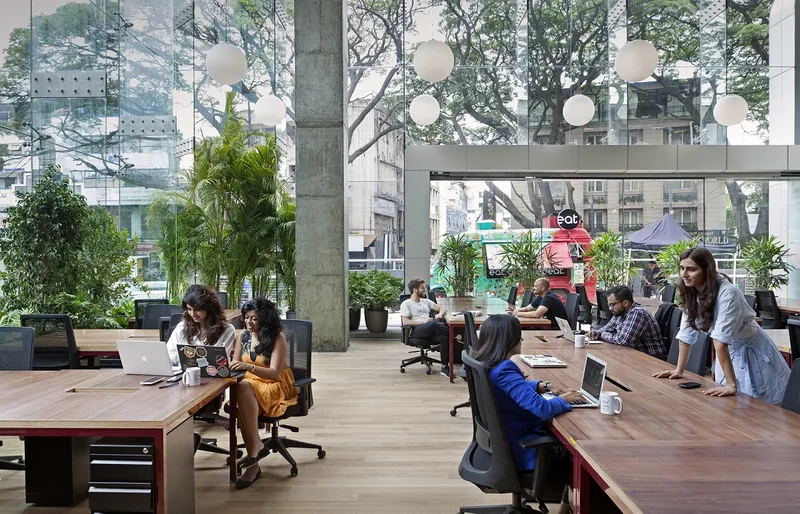
YS: How can better partnerships be forged between co-working spaces, industry and universities?
KV: In India, we have partnered with NASSCOM and Facebook to launch the Design4India studio at WeWork Koramangala with the aim of mentoring and growing startups that are using design to solve large scale problems. We encourage and invite partnerships with industry, university and government to champion the entrepreneurial ecosystem in the country. It is only a matter of time before we roll out more partnerships with different stakeholders.
WeWork globally is at the forefront of collaborating with various stakeholders in the community. We have partnered with Columbia Business School to host their school’s entrepreneurial alumni in our space in New York. WeWork recently launched its first space inside the University of Maryland campus.
YS: What are your recommendations for Indian policymakers to make business easier for co-working spaces, investors, and startups in India?
KV: India’s economic geography is still evolving and changes are happening at a much faster rate. The government has already started various initiatives like Make In India, Startup India, and Digital India, and further acceleration will help grow the Indian economy. The government’s continued focus on promoting entrepreneurship has helped India be at the helm of the transition journey towards becoming a leading innovation hub in the world.
There is, however, still a huge opportunity to scale up investments in physical and human infrastructure. At WeWork, we enable entrepreneurial stories in India by offering complete flexibility, which allows businesses to collaborate and thrive.
YS: Looking ahead, what are the top three transformations you are seeing in the future of work?
KV: This reminds me of a quote by Charles Kettering: “The world hates change, yet it is the only thing that has brought progress.” I would like to see a world exchanging ideas and sharing culture, irrespective of borders. The future of how we work will change soon and the following trends need to be adopted soon by organisations to be better prepared.
Change in workspace: With co-working spaces coming up in India, real estate, particularly will see rapid changes. The shift will demand innovation to transform workspaces from being purely functional to being more productive and experiential as well as meaningful.
Personal Touch: These days, people are not looking for traditional ‘9 to 5’ workspaces, they are looking for a place that will enhance their creativity, and provide flexibility and an atmosphere that will boost their and company’s growth. For example, we at WeWork organise regular events that give members a chance to socialise and build relationships.
Liquid workforce: A very famous concept in Europe is also catching up in India rapidly these days. It allows people to move away from full-time jobs to working according to their needs. This also creates interesting models like weekend working, thus eventually increasing the seat utilisation of an organisation.
YS: What are your recommendations or words of inspiration to the startups and entrepreneurs in our audience?
KV: Our founder Adam Neumann believes all companies need to do to succeed is put passion, purpose, people and product before profit. Profit will follow.
